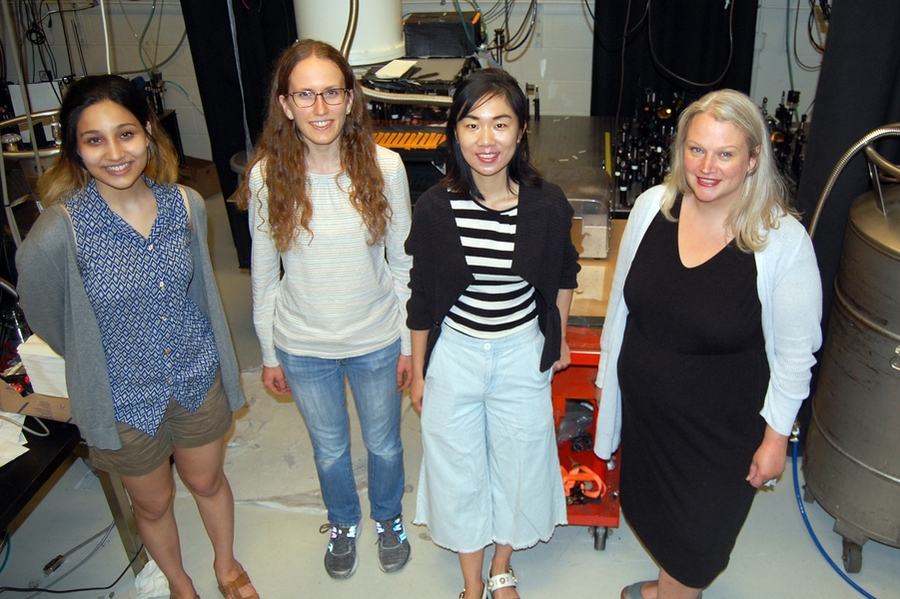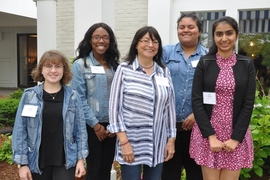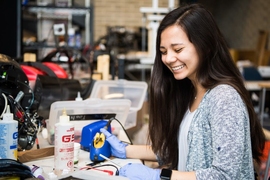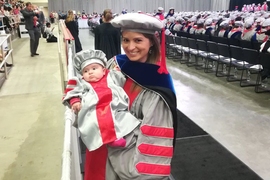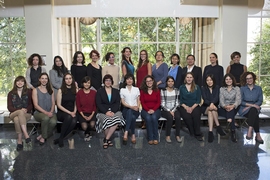There’s no doubt that in order to study physics, students must be first-rate learners. But another essential skill that may not be so obvious is the ability to craft a great research proposal, which is key to career advancement.
Early in her career, Lindley Winslow, the Jerrold R. Zacharias Career Development Assistant Professor of Physics at MIT, received mentorship that was crucial to her career path. She is now paying it forward with the launch of a physics research fellowship program to help undergrads, graduate students, and postdocs in the Department of Physics, especially within a particularly underrepresented group: female physicists.
Winslow’s pilot program not only offers money for research, but also builds in a workshop on preparing research proposals. “The program is more than just how to write a proposal,” said Winslow. “It is designing a self-contained research project and then writing the supporting research proposal. It is putting together the idea, budget, and timeline as well as the text.”
Winslow says while the program is open to all, it is aimed at women because at MIT alone, women make up only 22 percent of physics students, and 15 percent of physics faculty, if you include adjuncts and secondary appointments. In the hopes of increasing these numbers, Winslow received a $75,000 grant from the Heising-Simons Foundation to fund a program aimed at helping women in physics.
The heart of the program is to provide support on the research grant process, with guidelines of $5,000 for undergraduate projects, $10,000 for graduate student projects, and $15,000 for postdoctoral projects. Funds are expected to be used for non-stipend expenses including equipment, materials, supplies, computers, and travel for collaboration and scientific meetings. The proposals will be peer-reviewed in the National Science Foundation style, with Winslow acting as the program manager.
Winslow received 16 fellowship applications by the May deadline, and four were chosen. The first round of fellows selected are Clara Sousa-Silva, who is working on "Creating a Rosetta Stone for the Interpretation of Exoplanet Biospheres" with mentor Professor Sara Seager; Shuo Zhang, for her project "Probing MeV-GeV Cosmic-ray Particles in the Galactic Center," with Professor Kerstin Perez; Carina Belvin, for her project, "Investigating Nonequilibrium Magnetization Dynamics Using Ultrafast Terahertz Spectroscopy," under Professor Nuh Gedik; and Radha Mastandrea, for her project "Analyzing CMS Open Collider Data Though Machine Learning," with Professor Jesse Thaler.
The second round of proposals are due Dec. 7.
Winslow, an experimental nuclear physicist whose primary focus is on neutrinoless double-beta decay, modeled the fellowship on the 2010 $60,000 L’Oreal for Women in Science Fellowship that she earned while an MIT postdoc, which was from 2008 to 2012.
“I have been very lucky that I have had very strong mentoring, which I credit to my current success: My thesis advisor, who used the classical approach of having us contribute to the writing of the group grant, and my colleague at UCLA, who proofread my NSF CAREER proposal and told me I needed to make sure the big picture was front and center.”
It was her postdoc advisor, Professor Janet Conrad, who mentored Winslow on how to create a good proposal. “She took a very detailed approach of breaking down what is a good proposal, how to construct it, how to work with your program manager to tailor the budget and subject, and finally to deliver something that will be reviewed well by your peers,” said Winslow. “She was responsible for me applying to the L’Oreal and helped me re-write, refine, and edit that proposal (and a couple others since then).”
Winslow never forgot the importance of mentorship. In 2016, she was among a dozen leading scholars in physics and astronomy at a Heising-Simons Foundation summit that discussed academic and career pathways for women in these fields. She was also on the workshop committee for a separate Heising-Simons initiative at April’s Rising Stars in Physics Workshop, for women interested in navigating the early stages of academic careers in physics and astronomy.
At a kickoff event for the new fellowship, Winslow surveyed Women in Physics group members and discovered that few students knew much about the grant proposal process. “It was striking how confident they were that they could execute a research plan, but how that confidence disappeared when I asked about their ability to come up with ideas and actually prepare the proposal,” Winslow recalled.
To ensure their success, workshops trained applicants on how to put their best foot forward. “This program aims to “pull back the curtain” and teach our students and postdocs how that part of the system works,” says Winslow.
“The process of structuring projects and writing grants to support them is one of the most intimidating aspects of the academic path, and is a particular barrier for women. It’s these sorts of tasks — qualifying exams, physics GREs, job applications — that end up affecting women more due to a combination of confidence, unequal mentoring, and societal pressure. Confidence in your ability to get grants is integral to wanting to stay in the field, and the numbers (of women physicists) are so low that we cannot afford to lose anyone.”
